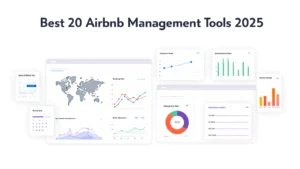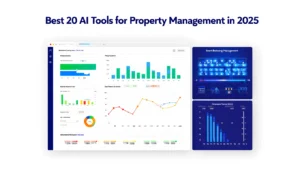The UK property market is like a moving train—you either jump on with the right timing, or you’re left standing at the station. Investors who hesitated during the post-COVID rebound missed double-digit growth in cities like Manchester and Birmingham. Now, as 2025 unfolds, the market is shifting again.
At Pearl Lemon Properties, we see investors making the same mistake: focusing on headlines instead of strategy. Rates are changing, rental demand is peaking, and legislation is reshaping buy-to-let. Those who wait for perfect clarity often find themselves priced out or caught holding underperforming assets.
This guide isn’t just another recap of numbers. It’s a playbook—a step-by-step breakdown of where the UK real estate market stands today, what investors must watch, and how to position your portfolio for returns while others hesitate.
Schedule a consultation with our team to learn how you can apply these insights directly to your situation.
The Current State of the UK Real Estate Market in 2025
The UK property market in 2025 is defined by falling interest rates, rising rental demand, and a chronic undersupply of new housing. Despite economic uncertainty, investor appetite remains strong as regional cities outperform London in yields while international buyers continue to take advantage of currency shifts.
Housing Demand vs. Supply Imbalance
Despite government pledges, housing delivery continues to lag behind demand. This imbalance is one of the biggest drivers of price stability and rental growth in the UK.
- According to the UK government’s Housing Supply report, new housing completions fell by 8% in 2024 (UK Gov, 2025).
- RICS reported that demand outstripped supply in 70% of local markets last year.
Investor Takeaway: Less supply means stronger rental yields and capital growth opportunities, especially in undersupplied regions like the North West.
Interest Rates and Mortgage Trends
Monetary policy has shifted from restrictive to cautiously accommodative, improving affordability for buyers and leveraged investors.
- The Bank of England base rate sits at 4.25% (Q3 2025), down from its 2024 peak of 5.25% (Bank of England, 2025).
- Mortgage approvals rose 6% year-on-year in the first half of 2025.
Investor Takeaway: Falling rates open attractive entry points for leveraged investors, but waiting too long risks paying more as competition heats up.
Rental Yields in Major UK Cities
Rental yields are increasingly polarized between London and regional cities, with the latter continuing to lead in profitability.
- Manchester: 7.1% avg gross yield
- Birmingham: 6.8%
- Leeds: 6.5%
- London (zones 1–3): 4.3% (Zoopla Rental Market Index, 2025)
Investor Takeaway: Regional yields outperform London, though outer London boroughs still provide capital growth potential for diversified portfolios.
Foreign Investment Inflows into UK Property
The UK remains a magnet for international capital, particularly as currency movements create discounts for overseas buyers.
- Overseas investors purchased 22% of central London residential properties in 2024 (Knight Frank, 2025).
- Weak sterling continues to incentivize both dollar- and euro-based buyers.
Investor Takeaway: Currency arbitrage makes UK assets especially attractive to non-GBP investors in 2025, particularly in London and other prime markets.
Book a consultation today to see how these market conditions can be converted into profitable acquisition strategies.
How Different Investors Should Approach 2025
Not all investors are facing the same challenges in 2025. Tax changes, shifting rental demand, and financing conditions affect landlords, overseas buyers, and portfolio holders differently, which means each group needs a personalized approach to stay profitable.
Buy-to-Let Landlords
Landlords are under pressure from regulatory changes, yet rental demand is at a decade-high, keeping this sector attractive with the right positioning.
- Regulation: Section 21 reform is tightening eviction rules.
- Demand: Tenant demand is at a 10-year high, particularly in urban rental markets.
- Strategy: Focus on high-demand tenant segments—students, professionals, and short-let markets.
Investor Takeaway: Compliance costs are rising, but so are opportunities for stable cash flow if landlords adapt to the right tenant markets.
International Investors
Overseas buyers continue to see the UK as a haven, though tax changes and operational challenges mean they must approach with precision.
- Tax Considerations: A 2% surcharge on non-UK buyers remains in effect.
- ROI Advantage: Currency weakness makes returns competitive when converted back to USD or EUR.
- Strategy: Use local management teams to reduce inefficiencies and maintain occupancy.
Investor Takeaway: Despite higher entry taxes, currency arbitrage and demand resilience make UK assets appealing for international capital.
First-Time Property Investors
New entrants face barriers with rising prices, but there are still viable pathways to building a portfolio if they target the right niches.
- Challenge: Entry-level investors face significant affordability constraints.
- Strategy: Target smaller HMOs or fractional investment schemes in growth cities where yields are stronger.
Investor Takeaway: Smaller, yield-driven investments provide first-time buyers with a practical entry point into the 2025 market.
Portfolio Investors
Larger investors are adapting by diversifying into alternative asset classes and scaling into growth markets beyond traditional buy-to-let.
- Diversification Play: Build-to-rent developments and student housing are outperforming single-let properties.
- Strategy: Balance stable income streams with opportunistic acquisitions in up-and-coming areas.
Investor Takeaway: Portfolios that balance core stability with selective growth investments will outperform in 2025.
Schedule a consultation, and we’ll map the best strategy based on your investor profile.
Geographic Hotspots: Best Places to Invest in UK Property 2025
Investment returns in 2025 won’t be spread evenly across the UK. Some cities are set for strong rental yields, while others offer long-term capital growth driven by infrastructure projects and population shifts, making location the single biggest factor in investor success.
London Prime vs. Outer Boroughs
London continues to split into two markets—prime central with steady appreciation and outer boroughs benefiting from affordability and regeneration.
- Prime Central London: Forecasted 2.5% capital appreciation for 2025 (Savills, 2025).
- Outer Boroughs: Barking & Dagenham, Croydon, and Lewisham show strong upside from infrastructure projects.
Investor Takeaway: Prime London offers stability, while outer boroughs deliver stronger growth potential for investors willing to look beyond Zone 1.
Manchester and Birmingham
These two cities are leading the regional market, powered by strong population growth and transport upgrades.
- Manchester’s population is growing twice as fast as the national average, driving 8% rental growth (ONS, 2025).
- Birmingham benefits from HS2 development, lifting demand in the city centre.
Investor Takeaway: Both cities remain top-tier choices for investors chasing yields and long-term tenant demand.
Northern Powerhouse Cities
Government investment and private development are reshaping the North, making secondary cities attractive for forward-looking investors.
- Leeds rental demand grew 12% in Q1 2025.
- Liverpool remains undervalued while offering some of the UK’s strongest gross yields.
Investor Takeaway: Northern cities offer better entry prices with strong yield potential compared to the South.
Emerging Secondary Markets
Smaller but fast-growing cities are creating opportunities for investors looking beyond the obvious.
- Bristol continues to show strength in rental demand, driven by its student population.
- Nottingham is experiencing above-average demand for student and young professional housing.
Investor Takeaway: Emerging cities offer investors an affordable way to diversify and capture early growth before larger funds move in.
Risks UK Property Investors Must Manage in 2025
Every investment environment has risks, and 2025 is no different. From regulation to financing costs, investors must prepare for challenges that could erode profitability.
Taxation and Regulation
Governments continue to target landlords with stricter rules, reshaping rental strategies across the country.
- Buy-to-let mortgage relief changes still impact net yields.
- Licensing requirements in cities like London and Liverpool have increased costs.
Investor Takeaway: Staying ahead of regulatory changes is essential to protect returns and avoid compliance penalties.
Interest Rate Volatility
Though rates are trending lower, investors cannot assume stable borrowing conditions throughout the year.
- The Bank of England cut rates to 4.25%, but inflationary shocks could reverse momentum.
- Sudden swings may impact affordability for highly leveraged investors.
Investor Takeaway: Fixed-rate financing remains a smart hedge against sudden market shifts.
Vacancy Risks
Tenant demand is strong overall, but some property types and locations face oversupply pressures.
- Short-term rental markets in certain cities are oversaturated.
- Some student-heavy areas show early signs of higher void periods.
Investor Takeaway: Proper tenant targeting and management reduce the risk of costly vacancies.
Brexit Aftershocks
The UK continues to feel the ripple effects of Brexit, particularly in construction and labour markets.
- Labour shortages still delay new housing projects.
- Supply chain disruptions push up renovation and construction costs.
Investor Takeaway: Investors should budget conservatively for refurbishment and development timelines.
Book a call to discuss which of these markets align with your long-term investment goals.
Risks UK Property Investors Must Manage in 2025
Every opportunity comes with its own set of risks, and the UK property market in 2025 is no exception. From shifting regulations to interest rate volatility and compliance costs, investors need to anticipate these challenges before they erode returns.
Taxation and Regulation
Policy shifts continue to weigh on landlords and reshape the economics of buy-to-let.
- Buy-to-let mortgage relief changes continue to impact net yields.
- Increased licensing requirements in cities like London and Liverpool.
Investor Takeaway: Investors need to factor compliance costs into their models to avoid surprises and protect margins.
Interest Rate Volatility
Falling rates have improved affordability, but the path ahead is not guaranteed to be smooth.
- While rates are falling, inflationary shocks could cause temporary upticks.
Investor Takeaway: Locking in favourable fixed rates provides stability against unexpected policy changes.
Vacancy Risks
Rental demand is high overall, but mismatched property types or locations can still leave landlords exposed.
- Short-term rental saturation in certain areas has raised void period risks.
Investor Takeaway: Careful market selection and strong tenant management are critical to reducing vacancy losses.
Brexit Aftershocks
Post-Brexit challenges continue to shape the property landscape, particularly for development and refurbishment.
- Trade and labour shortages are still impacting construction timelines.
Investor Takeaway: Build in extra time and budget for projects to account for supply chain delays and rising costs.
Schedule a consultation, and we’ll help you structure your portfolio to hedge against these risks.
Our Role in Helping Investors Profit in 2025
While most websites will leave you with charts and forecasts, we work differently. We interpret trends into transaction-ready strategies. That means identifying:
- Which postcodes deliver the best yield-to-risk ratio
- How to structure deals for tax efficiency
- When to buy and when to hold assets for maximum equity growth
If you’re an investor looking to position yourself in the strongest UK markets of 2025, book a call with us today.
Schedule a consultation and we’ll answer your specific questions in detail.
Why Choose Us for Your UK Property Investment Strategy
Investors don’t just need market reports—they need guidance that turns numbers into profits. That’s where we come in.
Here’s what sets us apart:
- Investor-Focused Approach
We don’t just show you where the market is heading. We show you how to act based on your personal investment profile. - Access to Off-Market Deals
Many of the best opportunities never hit the open portals like Rightmove or Zoopla. Our network puts you ahead of the competition. - End-to-End Support
From due diligence to financing structures, we assist at every stage of the investment journey. - Global Investor Expertise
Whether you’re UK-based or overseas, we understand the nuances of tax, compliance, and cross-border capital flows.
When you choose us, you’re not just getting advice—you’re gaining a partner that helps you turn market trends into profitable moves.
Schedule a consultation today, and let’s talk about how you can start building or expanding your property portfolio.
FAQs About UK Property Investment in 2025
What’s the average rental yield in the UK in 2025?
Gross yields average around 4.3% in London, while regional cities such as Manchester and Birmingham can deliver yields above 7% according to Zoopla’s 2025 Rental Market Index.
How will interest rates impact buy-to-let returns?
The fall in the Bank of England base rate to 4.25% has improved the ROI for landlords, but rising rents remain the stronger driver of returns in 2025.
Which regions offer the best gross vs. net yields?
Northern cities deliver higher gross yields, but net yields tend to be stronger in places like Leeds and Nottingham, where operating costs and void periods are lower.
How can international investors reduce withholding tax risk?
Non-UK investors can mitigate withholding tax by structuring purchases through UK companies and making use of double-tax treaties where available.
Is freehold better than leasehold in 2025?
Freehold provides greater long-term control and security, but leasehold flats in high-demand city centres are still attractive for rental yield and tenant demand.
How much capital do I need to start investing in UK property?
Entry-level investments typically start from £80,000 to £120,000 in Northern cities, while London and the South East often require upwards of £250,000.
Are HMOs still a profitable investment model in 2025?
Yes, HMOs remain profitable with yields between 8–10% in university cities, but stricter compliance rules mean that professional management is essential.
What impact will new energy efficiency regulations have on landlords?
By 2028, all rental properties must reach EPC rating C or above, and landlords should expect retrofit costs ranging from £5,000 to £15,000 per property.
Schedule a consultation to discuss these FAQs in detail and see how they apply to your investment goals.
Final Word: The Window of Opportunity
2025 isn’t a year to sit on the sidelines. The UK property market is full of contradictions—supply shortages, cooling rates, rising rental demand—but within that chaos lie opportunities for investors who act decisively.
Waiting for clarity means missing the best entry points. Acting with strategy means locking in gains while others hesitate.
The choice is yours.Book a call today and let’s map your investment strategy for 2025.





